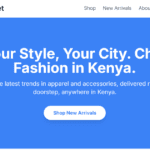SEO for B2C Products in Kenya Website
- Delivery Time2 Weeks
- English levelProfessional
- LocationUSA, United Kingdom, United Arab Emirates, New York, Nairobi, Kilimani, Kenya, Dubai, CBD Nairobi, Canada, Australia
Service Description
The cost of SEO for B2C Products in Kenya is 80000KES per month.Get SEO for B2C Products in Kenya at a price of 30000KES per month at Black shepherd Technologies.
Discover a curated selection of electronics, fashion, home goods, and more. Enjoy fast delivery, secure payments, and a seamless shopping experience. Shop now for quality products at unbeatable prices.
In the fast-paced and ever-evolving digital landscape of Kenya, an effective SEO strategy is not just a luxury—it’s a necessity for any B2C business looking to thrive. With a growing number of Kenyans relying on their mobile devices and search engines to find products, optimizing your online presence is the key to attracting and retaining customers. This guide delves into the core principles of SEO for B2C products in Kenya, providing a comprehensive overview to help you stand out from the competition.
1. Understanding the Kenyan B2C Consumer
Before diving into technicalities, it’s crucial to understand the Kenyan consumer’s behavior. The market is characterized by a high mobile penetration rate, with a significant portion of online shopping happening on smartphones. Kenyans often search for specific products, compare prices, and read reviews before making a purchase. They are also highly influenced by local trends, social proof, and the trustworthiness of a brand. Therefore, your SEO strategy must be mobile-first, locally-focused, and centered on building trust and authority.
2. Keyword Research and Localization
The foundation of any successful SEO campaign is thorough keyword research. For the Kenyan market, this means going beyond generic terms. You need to identify the specific phrases and terms that your target audience uses. For example, instead of just “shoes,” consider long-tail keywords like “affordable sneakers in Nairobi,” “school shoes for kids in Kenya,” or “buy running shoes online Kenya.” Tools like Google Keyword Planner can provide valuable insights into search volume and competition.
Localization is a critical component. This involves not only using geographical keywords (e.g., “Nairobi,” “Mombasa,” “Kenya”) but also creating content that is culturally relevant and addresses local pain points. For instance, a blog post on “5 Best Ways to Beat the Nairobi Traffic with E-Bikes” would be far more effective than a generic article on e-bikes.
3. On-Page SEO: The Building Blocks
On-page SEO refers to all the optimizations you make on your website’s pages to help them rank higher. For B2C products in Kenya, these elements are particularly important:
Title Tags and Meta Descriptions: These are your first impression on the Search Engine Results Page (SERP). The title tag should be compelling, concise, and include your primary keyword. The meta description, as generated above, should be a call to action that entices users to click.
Product Descriptions: Each product page needs a unique, detailed, and engaging description. Avoid duplicate content, which can harm your rankings. Highlight key features, benefits, and specifications. Use Latent Semantic Indexing (LSI) keywords—related terms that help search engines understand the context of your content.
Image Optimization: Product images are vital for B2C e-commerce. Optimize them by using descriptive file names (e.g., “red-leather-wallet-kenya.jpg”), adding alt text with relevant keywords, and compressing them to ensure fast page loading speeds.
Header Tags (H1, H2, etc.): Use header tags to structure your content logically. The H1 should be your main title, while H2s and H3s can be used for subheadings to break up the text and make it scannable for both users and search engines.
Internal Linking: Create a logical internal linking structure to guide users and search engines through your site. Link from blog posts to product pages, and from category pages to related products. This improves site navigation and helps distribute “link equity” across your website.
4. Technical SEO for a Seamless Experience
Technical SEO ensures that search engines can easily crawl, index, and understand your website. In Kenya, where internet speeds can vary, a fast and mobile-friendly site is non-negotiable.
Mobile-First Indexing: With most Kenyans on mobile, Google’s mobile-first indexing is paramount. Your site must be fully responsive, with a clean design, readable text, and easy-to-use navigation on all devices.
Page Speed: A slow-loading website is a major turn-off for users and a red flag for search engines. Use tools like Google’s PageSpeed Insights to identify and fix issues. Compress images, minify CSS and JavaScript, and leverage browser caching to improve loading times.
Structured Data and Schema Markup: This is a powerful tool for B2C products. By adding schema markup to your product pages, you can provide search engines with specific information like price, availability, and customer reviews. This can lead to rich snippets in search results, making your listings more appealing and increasing click-through rates.
Secure Connection (HTTPS): An SSL certificate is a must. It not only protects customer data during transactions but is also a ranking factor that Google takes into account.
5. Off-Page SEO: Building Authority
Off-page SEO involves activities outside of your website to build its authority and credibility.
Link Building: High-quality backlinks from other reputable Kenyan websites are a strong signal of trust to search engines. Consider guest blogging on local blogs, collaborating with local influencers, or getting listed in local business directories.
Local SEO: Optimize your Google Business Profile (formerly Google My Business) with accurate and up-to-date information, photos, and regular posts. Encourage happy customers to leave reviews, as this is a key ranking factor for local searches.
Social Media: While social media doesn’t directly impact rankings, it plays a vital role in B2C SEO. It helps build brand awareness, drives traffic to your site, and can lead to valuable social signals and backlinks.
6. Content is Still King
Creating high-quality, relevant content is the most effective long-term SEO strategy. For B2C products, this can include:
Blog Posts: Write articles that answer common questions or solve problems for your target audience. For example, a home goods store could have a blog on “Budget-Friendly Home Decor Ideas for Your Kenyan Apartment.”
Customer Testimonials and Reviews: Showcase positive reviews on your website and product pages. This builds social proof and trust, which are critical for converting visitors into buyers.
Video Content: Kenyans are big consumers of video content. Create product demo videos, tutorials, or unboxing videos to engage your audience and keep them on your site longer.
In conclusion, a successful SEO strategy for B2C products in Kenya requires a multi-faceted approach. By focusing on a mobile-first design, localizing your keyword strategy, optimizing your on-page elements, ensuring technical excellence, and building brand authority through off-page signals, you can secure a dominant position in the competitive Kenyan e-commerce market.








